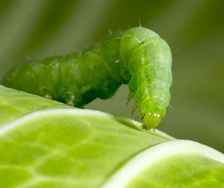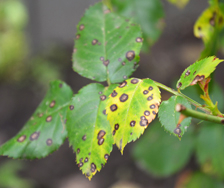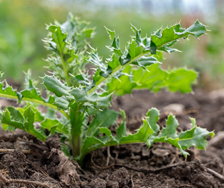Yates Account
Join now
Create a Yates account today!
Sign up to join the Yates Garden Club for monthly e-mails packed with seasonal inspiration, tips for success & exclusive promotions.
Plus if you’re a Garden Club member you can take part in the Yates Growing Community - a blog to share successes, get advice & win prizes in fun challenges along the way!

Forgot password
Enter the email address associated with your account, and we'll email you a new password.

It’s more than just ‘dirt’ – it’s the foundation of life in your garden, so it’s important to look after it. But, not all soils are created equal! If you want your plants to flourish, then you need to nourish it by adding organic matter. it's an essential ingredient in creating a nutrient-rich, healthy soil.
To keep your soil healthy and plants thriving, you need a good balance of soil organisms, including beneficial microbes like fungi, bacteria, archea, protozoa and earthworms. Even though your first thought might be "eww", all these little wriggly creatures have their place in a thriving soil ecosystem.
The soil area immediately around plant roots is called the rhizosphere. The rhizosphere of a healthy plant is especially rich with microbial life. These microbes are busy cooperating with the plant, by breaking down nutrients so they're available in a form plants can absorb. Plants can make their own food from the sun, but they can’t convert essential nitrogen by themselves, they rely on microbes to do it for them. Plants depend on soil microbes to survive!

Soil microorganisms, viewed with a microscope
So long as you’re improving your soil, these beneficial soil organisms will always follow. The best way to do it? Add plenty of compost - then supercharge the compost with Yates Dynamic Lifter Organic Plant Food.
The compost improves living conditions for microbes, by allowing oxygen and water to penetrate soil and providing a source of slow-release nutrients. Yates Dynamic Lifter adds a rich boost of nutrients to get the microbial community fizzing, along with plant-available nutrients to get your plants established quickly.

Even the Best Soil Needs a Helping Hand
Yates Dynamic Lifter Organic Plant Food improves soil health by increasing water and nutrient retention, while feeding and encouraging earthworms and microorganisms. It's a complete source of plant nutrition, containing organic slow release nitrogen, phosphorus and potassium. These essential ingredients deliver better root growth, stronger plants and more flowers and fruit. Nothing lifts gardens like Yates Dynamic Lifter Organic Plant Food - every garden needs a bag on hand! Make sure you mix it into your soil well, by turning it over with a garden fork.
Improving Clay Soils
If your soil is made up of heavy clay, then it’s really important that you remediate it before planting, for the ongoing health of your new plant. Soil improvements can take time to bed in, anywhere from 4-6 weeks or longer, depending on the condition of your soil.
Gypsum is an important tool to improve clay soil. The calcium content in gypsum interacts with clay particles in a process called 'flocculation', which causes the tiny clay particles to stick together to form crumbs. These crumbs increase porosity (a more open soil texture), which allows better air, water and nutrient penetration and movement through the soil. You can also use garden lime to break up clay soil, but gypsum has a big advantage: unlike lime, gypsum is pH-neutral, meaning it won't significantly alter the soil's acidity or alkalinity.
To achieve a long-term improvement to clay soil, dig in a generous amount of compost, Yates Gypsum 'Clay Breaker' Soil Improver Granules and Yates Dynamic Lifter Organic Plant Food. Fork it all through the soil to mix it in well. Cover the soil with a layer of organic mulch, like woodchip or pea straw, then water thoroughly. Continue to water over the next couple of weeks, to help all the organic matter break down. Have a little dig to explore the soil, to check that the compost has started to decompose; if the soil is still sticky and clay-like you can consider repeating the process.

Improving Sandy Soils
Sandy soil is often lacking in organic matter. The regular addition of compost will boost the soil's nutrient and moisture holding capacity, while improving its structure. Organic matter will also encourage increased populations of earthworms and beneficial microorganisms. Don't be scared to add rich sources of organic matter like Yates Dynamic Lifter Organic Plant Food to speed up the soil improvement process.
Plant Your Beds
Once you get the soil right, the rest of the job is relatively easy. To plant, dig a hole twice as large as the plant's pot. Add a big handful of Yates Dynamic Lifter Organic Plant Food into the hole, place the plant, add enough potting soil to fill the hole, then firmly push the soil down around the plant to compress it.
Always mulch and water well after planting out. Using organic mulch, like bark chips, sugarcane or pea straw, also helps improve the soil. Mulch reduces moisture loss, helps protect the top layer of soil from the elements and as the mulch breaks down, it adds organic matter to the soil. Reapply mulch as needed, to maintain good soil coverage.















Share
Share this article on social media